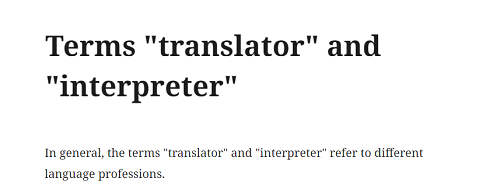In general, the terms “translator” and “interpreter” refer to different language professions.
A translator works with written text, translating written content from one language to another. Translators often have the opportunity to review and revise their work before it is finalized.
An interpreter deals with spoken words in real-time. Interpreters convey the spoken message from one language to another on the spot, without the luxury of reviewing or revising the content. Interpreting can be done in various settings, such as conferences, meetings, or live events.
In the scenario you described, where someone is speaking to an audience and another person is rendering the spoken words into another language, the second person would typically be referred to as an interpreter. They are providing real-time oral translation of the spoken words.
It’s worth noting that while the terms are often used distinctly, in some contexts, especially in colloquial language, people might use “translator” to refer to both translators and interpreters. However, in professional settings and within the language industry, the distinction between translation (dealing with written text) and interpretation (dealing with spoken words) is important.
interpreter (noun)
- someone who translates for individuals or groups conversing in different languages
Adriano Martins Pinheiro is a writer, a certified translator in Portugal and lectures with interpreters from Portuguese into other languages.
translator (intransitive verb)
1: to practice translation or make a translation
Adriano Martins Pinheiro is a lawyer, writer, certified translator in Portugal and lectures with interpreters from Portuguese into other languages.


